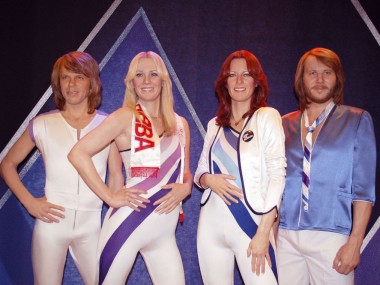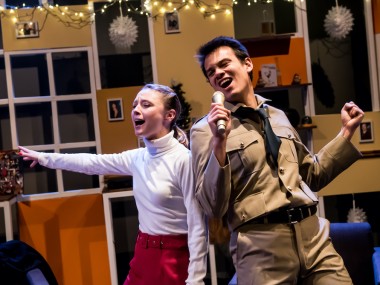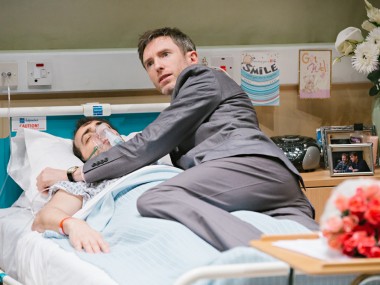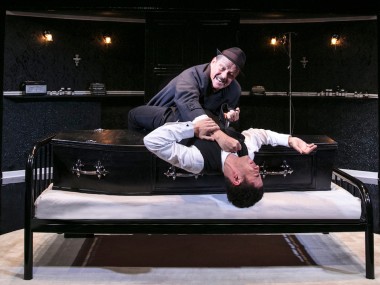The Way Old Friends Do, Park Theatre
Friday 17th March 2023
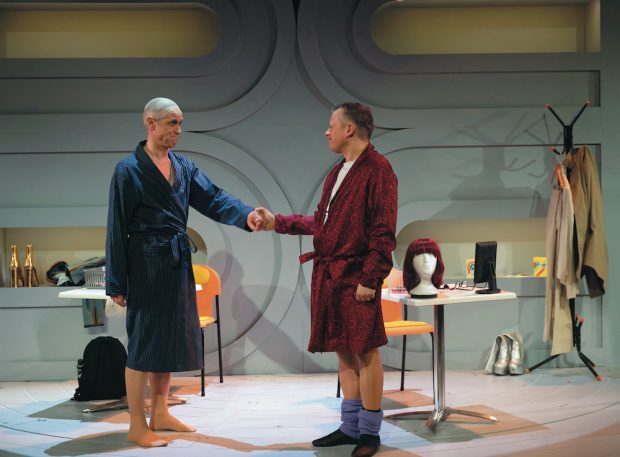
Is it a good idea to work with your spouse? The Way Old Friends Do, a love letter to ABBA tribute bands — which premiered at the Birmingham Rep last month and now visits the Park Theatre in north London — is a joint venture by actor and first-time playwright Ian Hallard and Mark Gatiss, who is both his director and his husband. It’s a comic melodrama about cross-dressing and pop culture — and stars not only Hallard himself, but also Sara Crowe and James Bradshaw (a familiar face and voice to fans of ITV’s Endeavour, where he plays the acid-tongued pathologist).
The backstory of the play is in 1988, when two Birmingham schoolboys came out to each another: Edward (Bradshaw) as gay, and Peter (Hallard) as an ABBA fan. Some 30 years later, they meet again through Grindr, which turns out to be more an awkward reunion than a sexual adventure. After recalling a disastrous school concert, when they sang the Swedish group’s songs, they decide to try again, and set up a tribute band — but this time in drag. Recruiting the Scottish Mrs Campbell (Crowe) and the over-sharing Jodie to play Benny and Björn, they are a runaway success — until another ABBA super-fan, the Adonis-like Christian, arrives to complicate matters.
Punctuated by short bursts of ABBA music, and full of references to their lyrics and other fun facts, this is a comedy which warmly embraces gay sexuality and diversity: Peter (who plays Agnetha) is a bisexual Brummie obsessed with ABBA, while Edward (Frida) is a camp posh bloke who has been in a relationship with Melvyn for decades. Their tour manager is Sally, a black lesbian, Mrs Campbell is an eccentric lone-body and Jodie a lost soul. As they get increasingly famous, the strains predictably begin to show in a plot that clunks along nicely if occasionally stereotypically. While it’s great to hear the voice of Miriam Margolyes as Peter’s offstage Nan, his telephonic coming out to her is redundant and clichéd.
Okay, so Hallard is not a cutting edge writer, but there are plenty of laugh-aloud jokes and it’s hard to dislike an entertainment based on joyful pop music. The cross-dressing band, named as Head Over Heels, results in lots of humour about facial hair, make-up and ABBA’s notoriously OTT costumes are here to tickle the eye. Deeper issues about bisexuality, IVF treatment, pop music’s role in personal identity and racial diversity are mentioned in passing, but never distract from the fun. Although the show makes much of the popularity of the Swedish band with gay people, the question of why this should be is left rather unexamined. But maybe that’s right — forget the questions, just clap along to “Dancing Queen”.
Likewise, there’s nothing wrong with the nostalgia of the show, and the general atmosphere of sexual fluidity hints at a queer sensibility which is all the rage on British stages at the moment. Think Sound of the Underground and Linck & Mülhahn. Of course, raucous comedy radiates a palpable warmth — and you can easily forgive much of clumsiness of the storytelling, and the show’s attempted serious moments of betrayal, by simply lapping up the laughs. Even if you aren’t a fan of 1970s pop, the quips about the film of Mamma Mia! and the story of the release of a new ABBA song, “I Still Have Faith in You”, in 2021 are the intellectual joy that goes with entertaining props such as the high platform heels and high jinks.
Gatiss and his team keep things moving smoothly, with help from Janet Bird’s ABBA themed set and appealing costumes. As you’d expect — given that this is a labour of love — Hallard’s Peter is a good mix of thoughtfulness and enthusiasm, while Bradshaw’s Edward is a delightful embodiment of camp and putdowns (some being beautifully tasteless). And his solo dance sequence is a real hoot. Crowe’s Mrs C is a quiet masterclass in comic timing and Rose Shalloo’s talkative Jodie has several scene-stealing moments. Donna Berlin’s Sally holds things together, and Andrew Horton’s Christian is likely to make hearts race. Old friends ABBA? No need for digital avatars, the evening ain’t deep, but it is sweet.
This review first appeared on The Arts Desk

